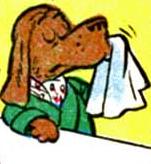
From Wikipedia:
Seduction of the Innocent is a book by American psychiatrist Fredric Wertham, published in 1954, that warned that comic books were a negative form of popular literature and a serious cause of juvenile delinquency. The book was a minor bestseller that created alarm in parents and galvanized them to campaign for censorship. At the same time, a U.S. Congressional inquiry was launched into the comic book industry. Subsequent to the publication of Seduction of the Innocent, the Comics Code Authority was voluntarily established by publishers to self-censor their titles.
Seduction of the Innocent cited overt or covert depictions of violence, sex, drug use, and other adult fare within "crime comics" — a term Wertham used to describe not only the popular gangster/murder-oriented titles of the time, but superhero and horror comics as well. The book asserted, largely based on undocumented anecdotes, that reading this material encouraged similar behavior in children.
Comics, especially the crime/horror titles pioneered by EC, were not lacking in gruesome images; Wertham reproduced these extensively, pointing out what he saw as recurring morbid themes such as "injury to the eye". Many of his other conjectures, particularly about hidden sexual themes (e.g. images of female nudity concealed in drawings of muscles and tree bark, or Batman and Robin as gay partners), met with derision within the comics industry. (Wertham's claim that Wonder Woman had a bondage subtext was somewhat better documented, as her creator William Moulton Marston had admitted as much; however, Wertham also claimed Wonder Woman's strength and independence made her a lesbian. However, she is traditionally portrayed as a heterosexual and a virgin). Wertham also claimed that Superman was un-American and was a fascist.
Wertham critiqued the commercial environment of comic book publishing and retailing, objecting to air rifles and knives advertised alongside violent stories. Wertham sympathized with retailers who didn't want to sell horror comics, yet were compelled to by their distributors' table d'hôte product line policies.
The fame of
Seduction of the Innocent added to Wertham's previous celebrity as an expert witness and made him an obvious choice to appear before the Senate Subcommittee on Juvenile Delinquency led by anti-crime crusader Estes Kefauver. In extensive testimony before the committee, Wertham restated arguments from his book and pointed to comics as a major cause of juvenile crime. The committee's questioning of their next witness, EC publisher William Gaines, focused on violent scenes of the type Wertham had decried. Though the committee's final report did not blame comics for crime, it recommended that the comics industry tone down its content voluntarily. Possibly taking this as a veiled threat of potential censorship, publishers developed the Comics Code Authority to censor their own content. The new code not only banned violent images, but entire words and concepts (e.g. "terror" and "zombies"), and dictated that criminals must always be punished. This destroyed most EC-style titles, leaving a sanitized subset of superhero comics as the chief remaining genre. Wertham nevertheless considered the Comics Code inadequate to protect youth.
Seduction of the Innocent was illustrated with comic-book panels offered as evidence, each accompanied by a line of Wertham's sardonic commentary. The first printing contained a bibliography listing the comic book publishers cited, but fears of lawsuits compelled the publisher to tear the bibliography page from any copies available, so copies with an intact bibliography are rare. Early complete editions of
Seduction of the Innocent often sell for high figures among book and comic book collectors.
Among comic-book collectors any comic book with a story or panel referred to in Seduction of the Innocent is known as a "Seduction issue", and is usually more valued than other issues in the same run of a title. Seduction of the Innocent is one of the few non-illustrative works to be listed in the
Overstreet Comic Book Price Guide as a collectible in its own right.
Download Link


















